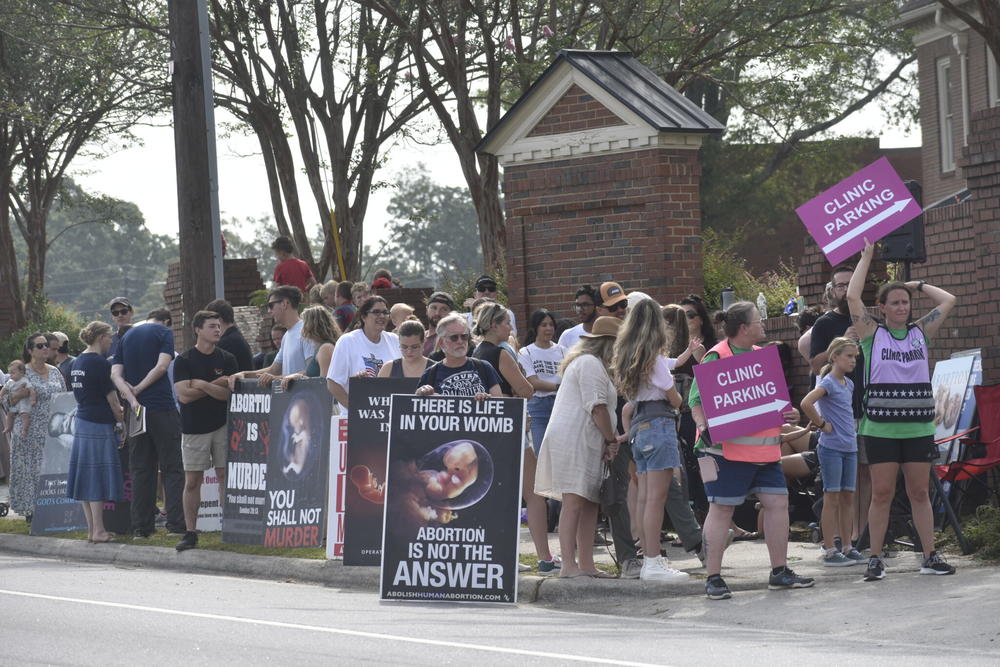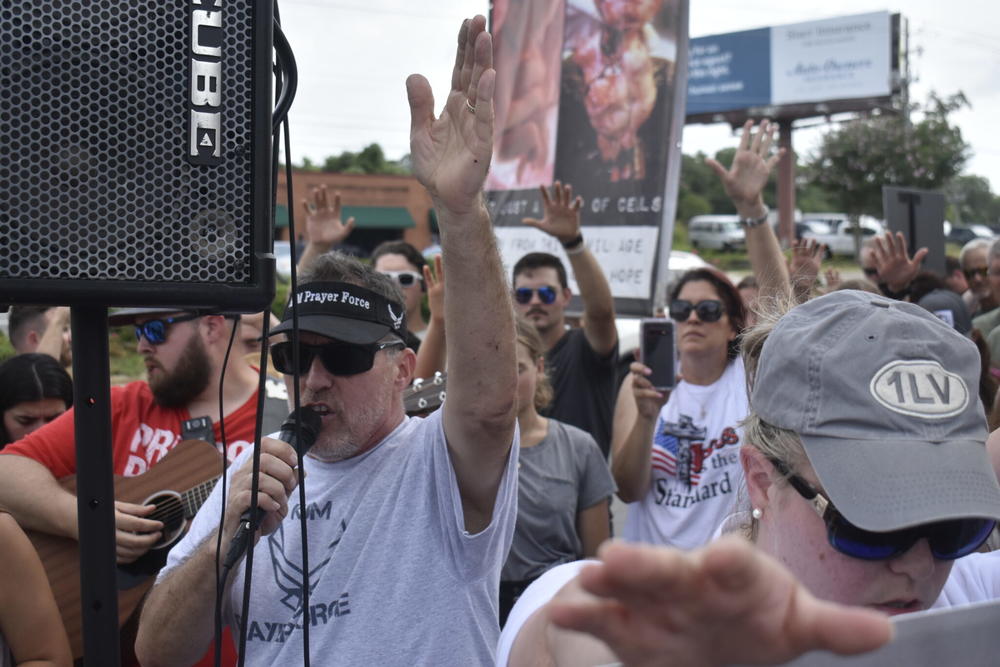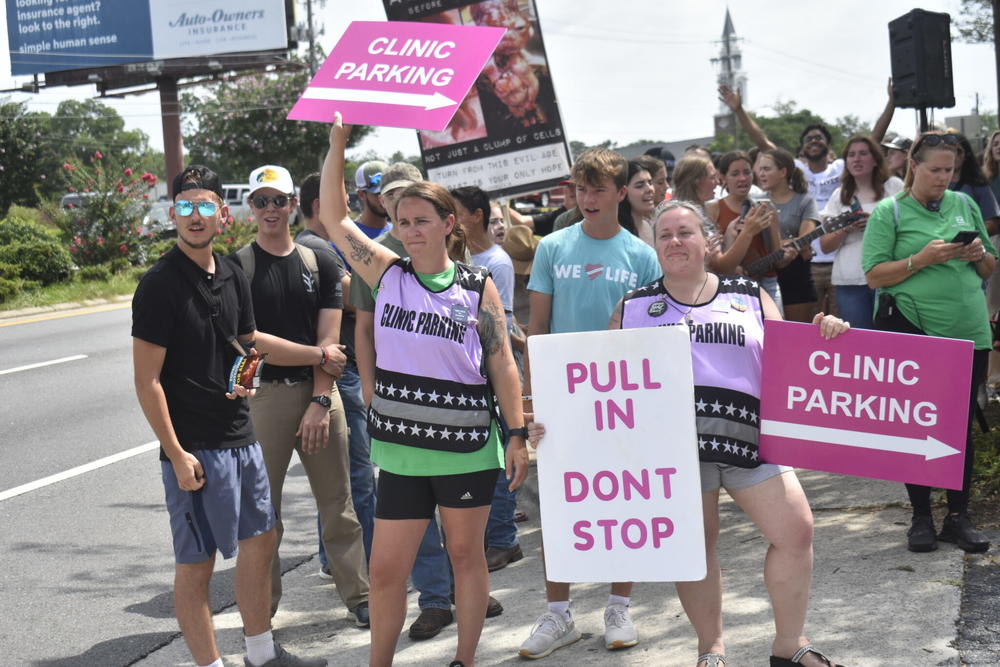
Caption
Anti-abortion protesters gather outside A Preferred Women’s Health Center of Atlanta in Forest Park.
Credit: Ross Williams/Georgia Recorder

Anti-abortion protesters gather outside A Preferred Women’s Health Center of Atlanta in Forest Park.
Protesters filled several blocks of sidewalk outside A Preferred Women’s Health Center of Atlanta on Friday morning, the fourth day of protests there this week. Many wore T-shirts and held signs to declare which side they were on, and several congregated near the parking lot entrance to speak into microphones and tell any abortion clinic visitors to keep their babies. At one point, the loudspeaker played the sound of a baby crying, which counterprotesters drowned out with pop music.
Across the road in the grassy median, anti-abortion protesters affiliated with Operation Save America stood by a small white casket with dolls meant to represent the various gestational ages of a fetus resting on top. At one point, a woman stopped in the middle of the road and rolled down her window to give them a piece of her mind.
Preferred Women’s Health took center stage this week as Operation Save America conferred in Atlanta with its supporters to deter people from seeking abortion while strategizing its push for banning abortion at any stage of pregnancy in every state, including criminal charges for the pregnant person. On Thursday evening, the religious organization held sessions at Pray’s Mill Baptist Church in nearby Douglasville, where topics included spiritual warfare on abortion, the LGBTQ community and turning away from conservatism.
“Conservatism is deadly because it’s never found a cause for which it is willing to die,” Philip “Flip” Benham, a former director of Operation Save America, told conference attendees Thursday night.
The gathering comes 35 years after the contentious three-month “Siege of Atlanta” anti-abortion protests that saw hundreds arrested for interrupting clinical operations around the city.
Amid stories of the 1988 protests, Benham and Rusty Thomas, who are former directors of Operation Save America, talked Thursday night about turning away from today’s conservative party and relying on the church. Other speakers echoed the same sentiment, stating that the church could and should be the entity to bring about the end of abortion.
Benham spoke of abortion as the taking of an innocent life that has a voice calling out for vengeance. Until that issue is taken care of — meaning a full national ban with no exceptions for any reason — nothing else matters, he said.
“You’re going to shed blood in the womb, you’re going to reap it in the streets,” Benham said.
In the same discussion, Benham and Thomas also acknowledged Operation Save America experienced a rift in the 1990s when a leader affiliated with the group distributed wanted-style posters with a picture of Dr. David Gunn, an abortion provider in Alabama. Anti-abortion protester Michael Griffin shot Gunn in the back three times in March 1993 and killed him.
Benham said the killing divided the group at the time, with some believing it was justifiable homicide and others not supporting Griffin. “You can’t solve the problem of murder by murdering everybody,” he said.
Still, Operation Save America has been described as part of a small cluster of militant, anti-abortion groups, who subscribe to far-right political beliefs about the COVID vaccine, the 2020 presidential election and gun rights. Jason Storms, OSA’s national director, participated in the Jan. 6, 2021, storming of the U.S. Capitol and has called on followers to prepare for combat.
Georgia has a ban on abortion after six weeks of gestation, before many people know they are pregnant, that went into effect in November 2022.
Abortions at Preferred Women’s Health are induced by medication, according to clinic escort and Abortion Access Front staffer Max Carwile. Individuals take mifepristone in front of a physician and then take misoprostol at home in the following days.
According to data provided by the Georgia Department of Public Health, the state recorded 42,212 abortions in 2021, then 39,091 abortions in 2022. Between January and June, 14,732 abortions have been performed. Of those, more than 11,000 were Georgia residents, and nearly 1,800 were from the state of Alabama, versus 3,251 abortions for the full year in 2022.

A man who declined to give his name leads the crowd in prayer.
This week’s demonstrations were seemingly uneventful compared to the scene in 1988. Although the two sides are deeply divided on the issue, they intermingled frequently Friday. Volunteers with Abortion Access Front joined with those from We Engage to run interference between the OSA protesters and people arriving at the clinic for appointments, but they also bantered and often started conversations with the anti-abortion protesters.
Derenda Hancock, who worked as a Pink House Defender in Mississippi for 10 years before the clinic closed in July 2022, traveled as a volunteer with We Engage to Atlanta for the event and said engagement is part of their strategy to counteract groups like OSA.
“For years, it’s been a rule that you don’t engage,” Hancock said. “Should they be comfortable on the sidewalk?”
It started with small tactics like playing competing music, she said, and evolved into fuller conversations that had the added effect of distracting protesters long enough to let cars come into the clinic parking lot without as much notice.
“Everything about engagement is still for the patients,” she said. “Should they be comfortable on the sidewalk? We’ve allowed them to just take over the sidewalk. We shouldn’t do that.”
Friday’s calm followed the boisterous rhetoric presented Thursday evening. In addition to Benham and Thomas, Raymond Ibrahim, author of Defending the West, spoke about what he called the “case study” of Muslims and Christians battling each other throughout history. Ibrahim has been called Islamophobic for his views by the Council on American-Islamic Relations.

Abortion rights volunteers attempt to stand between potential patients and anti-abortion protesters.
Those attacks by Muslims, he said, are a caution to Christians to stand up and fight in the face of what he called the oppression of legal abortion and LGBTQ matters, including the existence of drag queens. He said they are “a fat man in a dress.”
Ibrahim urged attendees to fight back instead of “turning the other cheek” as some Christians advocate according to the Bible.
He called that cowardice. Quoting Saint Augustin, Ibrahim said, “It is the injustice of the opposing side that lays on the wise man the duty to wage war. So if you’re evil, it’s my duty as a Christian to stop that. Not to say, ‘Oh, well, who am I to judge him? Let him go.’”
When conference attendee, Marcus Schroeder, 19, asked Ibrahim how to physically obstruct things they believe are wrong, Ibrahim’s answer was unclear.
“Well, I think the kind of thinking I’m trying to promote should be spoken at every pulpit, for starters. There’s too many Christians who preach passivity,” Ibrahim said. “You need a more militant mindset, bottom line. …We gotta start being as wise as serpents.”
States Newsroom also approached Ibrahim to ask for clarity about what he was suggesting in practical terms. He said, “Are you hostile to this?” and then excused himself.
Schroeder said he didn’t think Ibrahim fully answered his question about what to do to try to physically stop local drag queen events, which is something Schroeder protests in the Milwaukee, Wisc., area. Schroeder said he and the dozens of young activists he protests with at drag queen story hours are contemplating similar tactics to old-school, anti-abortion blockades.
“I guess our position … is it would not be right for us to kill a drag queen or something. It wouldn’t be right for us to militantly stop drag queens,” he said. “But I guess the heart of my question was less of, ‘Should we go to war over it right now?’ and more of like, ‘Is there something physically we can do to stop this?’”
States Newsroom reproductive rights reporter Sofia Resnick and Georgia Recorder reporter Ross Williams contributed to this report.
This story comes to GPB through a reporting partnership with Georgia Recorder.